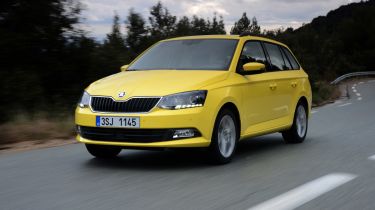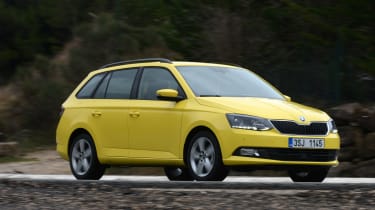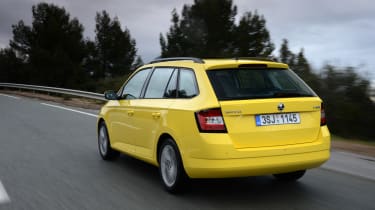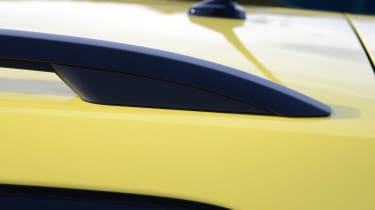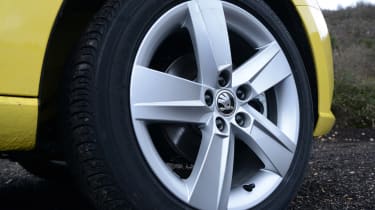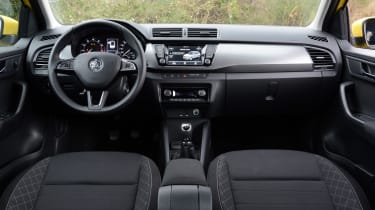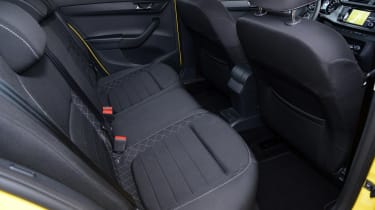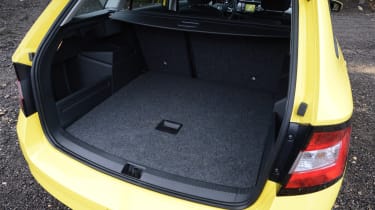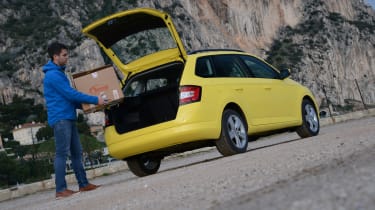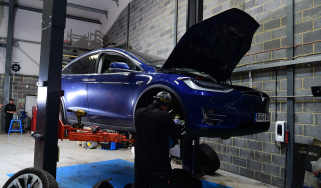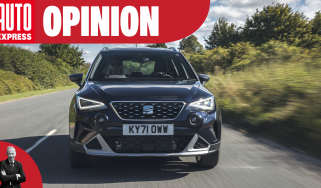Skoda Fabia Estate (2015-2021) review
Skoda Fabia Estate is a spacious supermini that features lots of equipment as standard and promises low running costs

Just so you know, this is an older review of the 2015-2021 Skoda Fabia Estate. If you are interested in information about the latest Skoda Fabia, or news about upcoming Skoda models, please follow the links provided.
The latest Skoda Fabia hatchback has already impressed with its blend of space, style and value for money, and the Estate version adds an extra dose of practicality.
The Skoda Fabia Estate doesn’t have many rivals. Aside from the budget-focused Dacia Logan MCV, its only true competitor – the SEAT Ibiza ST – disappeared when the new Ibiza hatch was launched in 2017. The third-generation Fabia Estate is more grown-up than the car it replaces. There’s no getting away from the fact it’s a bit more expensive, too, although an increase in standard equipment should work in buyers’ favour.
While there’s still definitely a distinction between Skoda and Volkswagen-branded models, the Fabia’s interior takes a welcome jump in quality, with more high-grade materials and big-car options such as SmartLink+ connectivity and keyless go available on top-spec cars. Yet even basic S versions come with electrically adjustable and heated door mirrors, electric front windows and a DAB radio.
The Fabia Estate engine range has been pared down to include just a single 1.0-litre three-cylinder unit, producing either 94bhp or 108bhp. The 59bhp 1.0-litre offered in the hatchback isn’t available in the Fabia Estate, and there’s also no option of the twin-clutch DSG automatic, as all cars now come with a five- or six-speed manual gearbox as standard.
Used - available now

2025 Audi
Q3
50,662 milesManualPetrol1.5L
Cash £17,697
2017 Kia
Sportage
45,000 milesManualDiesel1.7L
Cash £10,397
2018 SEAT
Ibiza
48,000 milesManualPetrol1.0L
Cash £10,197
2024 Volkswagen
Golf
26,316 milesManualPetrol1.5L
Cash £19,176There’s equally simple choice with the available trim levels - S, SE, SE Drive and SE L offer logical progression in equipment, with the sportier-looking Monte Carlo now heading up the range.
The latest Skoda Fabia Estate improves on its predecessor with more dynamic styling, even greater interior space and a more upmarket feel. So, it’s no surprise that prices have risen to match. Nevertheless, the package is difficult to beat for drivers who need a small car with the maximum carrying capacity.
Skoda has dropped diesel engines from the Fabia range, opting instead to go with small capacity petrol units which aim to provide improvements in economy, emissions and are actually more powerful than the previous 1.2-litre four-cylinder engine. With generous standard equipment, a great reputation for reliability and a strong safety package, the Fabia Estate makes a sound choice for drivers seeking no-frills practicality on a budget.
Engines, performance and drive
The Fabia Estate is enjoyable to drive with petrol power, but despite the fact that Volkswagen and Skoda bosses say the new Fabia is around 44 per cent based on the advanced MQB platform that underpins a range of other VW Group models, the car is in fact a heavily reworked version of the old model.
Skoda has allowed designers to make the latest Fabia lower and wider than before, as well as increasing the length of the wheelbase slightly in an effort to boost cabin space.
On the move, the car feels like its hatchback cousin; nippy and agile around town. That means it responds eagerly to your inputs, turning into corners sharply and benefiting from plenty of grip. While there’s some body roll, the suspension does a good job of controlling any wayward movement.
Although the Fabia was never intended to be a sports car, there’s plenty of grip available if you do push on. Body roll remains well contained, and with the turbocharged petrol engines, there’s a decent amount of punch, too. As with many VW Group cars, the steering is well weighted, if a little lacking in fun, but the Skoda certainly doesn’t feel unwieldy.
However, the ride suffers from the extra weight over the hatch, and the Skoda fidgets over bumps that some rivals take in their stride. The suspension also transmits more noise into the cabin.
Engines
Skoda has made life incredibly easy when choosing the right engine to power the Fabia Estate - there’s one three-cylinder petrol unit available with either 94bhp or 108bhp. The more powerful version is offered with a six-speed manual gearbox, delivering 0-62mph in 9.7 seconds and a 123mph top speed. The base variant makes do with a five-speed manual and manages a 10.8-second sprint time, with a maximum 116mph.
MPG, CO2 and running Costs
With prices starting from around £15,500, fuel efficiency of up to 52mpg on offer (under new WLTP testing), plus relatively low tax rates, the Fabia Estate still makes a lot of financial sense.
Despite its extra size and bulk, the Fabia Estate claims almost identical fuel economy and CO2 emissions to the less practical hatchback. The entry-level 94bhp model in basic S trim emits 121g/km, while the 108bhp version is only slightly higher at 123g/km, according to Skoda’s official figures.
Fuel economy is fairly consistent throughout the range, with both power units delivering respectable performance and running costs - the 94bhp variant offers up to 52.3mpg, while the 110bhp version still manages 51.4mpg.
All things considered, the Fabia still offers decent value when you take into account the impressive level of standard kit and rock-bottom running costs.
Insurance groups
Insurance group ratings for the Fabia Estate start at group 8 for the entry-level car, with the most expensive premium in the line-up reserved for the range-topping 108bhp Monte Carlo model, which sits in insurance group 12.
Depreciation
In spite of Skoda’s consistently improving reputation, the Fabia Estate's depreciation curve is quite stark. Buyers can expect the car to retain only around 35% of its purchase price after three years and 30,000 miles. Pushing the boat out on luxury versions won’t improve the residuals later as used buyers will be looking primarily for economy.
Interior, design and technology
The previous-generation Fabia Estate was sensible rather than stylish; it didn’t pretend to be anything other than a practical small car. However, Skoda has attempted to give its replacement a more distinctive look. So, while the car uses the same sheet metal as the five-door model from the nose through to the C-pillars, beyond this point the Estate is all-new.
Happily, Skoda’s designers have done a good job of integrating the longer rear overhang and roofline of the Estate bodystyle, as well as the extra side windows. SE models and above benefit from roof rails as standard, while buyers can boost their car’s kerb appeal by adding a bold Race Blue paint finish, for example. A set of 17-inch alloy wheels can also be specified for around £370 extra. Overall, the Estate has a far more dynamic shape than before, and it looks pretty upmarket.
The smart styling continues inside. Piano black trim inserts help give the neatly designed dashboard a lift, while the instrument dials and standard touchscreen have a simple, easy-to-use layout with robust switchgear.
The cabin feels solidly constructed and should be more than up to the rough and tumble of family life. There are hardly any soft-touch plastics – which is a shame as it would help to add more of a premium air – although the soft leather covering the steering wheel and gear lever (on SE trim and above) looks and feels good.
Sat-nav, stereo and infotainment
The Fabia Estate comes with plenty of kit as standard. For example, the base S model benefits from a DAB radio, Bluetooth, a 6.5-inch touchscreen display and a USB port. However, you have to upgrade to the SE to gain Smartlink+ connectivity and rear parking sensors. The SE L version also offers sat-nav, climate control and cruise control to complete a generous list of equipment.
Practicality, comfort and boot space
If the standard Skoda Fabia isn’t quite practical enough, then the Fabia Estate could be right up your street. While small estate cars aren’t that common in the UK, it’s easy to see the appeal when you take a look inside – the new load-lugging Fabia has a more spacious cabin than the hatch, and an even bigger boot than before.
There are some neat storage solutions throughout the interior. The side door bins aren’t huge, but there’s space for a water bottle and enough room for a map and other assorted oddments. You’ll find two cup-holders ahead of the handbrake, as well as handy hidden drawers under the front seats.
Size
If you need a small car with space, the Fabia Estate is pretty much unbeatable thanks to its boxy outline – and it doesn’t take up too much more tarmac than a regular supermini. At 4,262mm long and 1,732mm wide, it’s 29cm longer and barely any wider than a five-door Ford Fiesta. The cheap and cheerful Dacia Logan is a little longer again, at 4,501mm.
Leg room, head room & passenger space
The Fabia Estate is pretty good for passengers, too, with enough space in the back for six-foot adults. There’s plenty of headroom and generous knee room thanks to the extended wheelbase, and if you’re prepared to squeeze, you’ll even fit three across the back.
Boot
Behind the rear seats you’ll find a whopping 530 litres of luggage space. That’s not just huge for a supermini, but almost as large as the boot in a Ford Mondeo, which sits not one but two classes above the Fabia. Fold the seats flat and the Skoda’s maximum capacity of 1,395 litres should prove more than enough for the entire family’s clobber. That said, if you’re prepared to sacrifice a degree of comfort and quality, the Dacia Logan MCV wins the outright space race hands down.
Reliability and Safety
In our 2020 Driver Power satisfaction survey, Skoda finished a credible fifth out of 30 manufacturers, well ahead of more premium brands such as BMW, Mercedes and Audi. Customers reported positively on practicality, reliability and running costs.
Euro NCAP has awarded the hatchback a full five-star crash safety rating, and there’s no reason to suggest the Estate should fare any differently. The independent testers gave the five-door a score of 81 per cent for adult and child occupant protection, plus pedestrian protection was rated at 69 per cent.
All versions come with six airbags, stability control and seatbelt reminders, while SE models have an alarm and front fog lights..
Higher-spec SE and SE L cars come with the option of driver fatigue detection, along with kit such as blind spot monitoring and adaptive cruise control.
Warranty
The Skoda Fabia Estate comes with a three-year warranty, and although there’s a 60,000-mile limit, it only applies in the third year. So effectively you get the first two years with unlimited mileage, but if you rack up the miles at a vast rate you could be left with no cover at all on a two-year-old car.
Servicing
Pre-paid dealer servicing plans are available for the Skoda Fabia Estate that allow you to spread the cost into monthly payments, although the rates are variable depending on your mileage and the period you want cover for. Overall, maintenance costs should be pretty competitive with other mainstream superminis.

